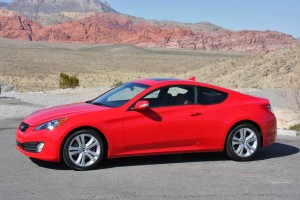
Hyundai's new Genesis Coupe joins a rapidly-expanding line-up, but could Hyundai soon have too many products to sustain?
This is a decidedly democratic downturn. Even some of the strongest brands, like Toyota and Mercedes-Benz, have been suffering declines well into the double-digits, in recent months. Only a rare few marques have defied the recession, with sales holding at least steady with last year’s levels.
Hyundai is a member of that exclusive club, one senior executive recently quipping that “flat is the new up.”
The Korean carmaker’s success might have come as a surprise only a few years ago, when it was the butt of frequent jokes on the late-night talk show circuit. But a combination of value, an assortment of new products – and a creative incentive program meant to shield customers from the ravages of the recession – have paid off even more than senior company officials had predicted.
But can Hyundai keep its momentum going? Even CEO John Krafcik admits it won’t be easy if the economy doesn’t start cooperating again soon.

Hyundai Motor America CEO John Krafcik: maintaining momentum in a down market by assuring customers fearing for their jobs.
The Hyundai Assurance “seems to have done some pretty incredible things,” said the affable executive, during an interview in Las Vegas, where the carmaker is formally launching the second model in its new Genesis line-up. “We think it’s responsible for 10 percent incremental sales,” Krafcik said about the program, in which customers who lose their jobs during the first year of owning a new Hyundai vehicle can return it without penalty.
That’s enough to keep Hyundai sales stable and, in turn, increase its market share in an otherwise down market. In 1998, the then-struggling carmaker accounted for just 0.6% of the American market. Last year, that jumped to 3.1%, while share has surged to 4.1% for the first two months of 2009.
That’s only one of the metrics working in Hyundai’s favor. Residual values – think trade-ins – have risen from a weak 37% in 2005, to nearly 44% last year. Even more significant, data from the automotive research firm, Allison Fisher, shows that 26% of American car buyers would now consider a Hyundai product. That’s still modest, Krafcik acknowledged, but more than double the 12% consideration rate in 2001.
It’s helped to have a steady expansion in the product line-up, which has planted Hyundai in a variety of new product segments. There are 10, in all, today, notably including the Genesis sedan which, in January, was named North American Car of the Year by a jury of 50 top auto journalists. (In full disclosure, I am one of that body.)
The line-up will keep growing. The latest addition is the Genesis Coupe, a sporty two-door designed to challenge such offerings as the Infiniti G37, Mazda RX8 and BMW 335i. The latter competitor might have once seemed a real stretch, but a surprising number of Genesis sedan customers have been trading in European imports, including BMW’s 5-Series, data show.
Still more product is coming, including a replacement for the mid-size Sonata, and the new Elantra Touring. Hyundai will add a new line-up of high-mileage variants, dubbed Blue Line, later this year, and its first hybrid, based on the next-generation Sonata, will debut in 2010. The well-received Veloster concept vehicle will also go into production as, Krafcik suggests, “the spiritual successor to the Tiburon,” Hyundai’s entry sporty coupe.
New product isn’t always a plus, however, Krafcik acknowledges. Even the 10 models now in Hyundai showrooms can be “very difficult to support,” he says. It can run upwards of $50 million in marketing money to keep a product fresh in the minds of consumers, even more when establishing an all-new line, such as Genesis. That’s “not sustainable,” the Hyundai CEO concedes, if you’re only selling about 400,000 vehicles a year, or roughly 40,000 of each model.
The challenge is to come up with a creative solution – such as marketing “clusters” of vehicles – tying the Genesis Sedan and Coupe together, for example, or the various Elantra models.
Hyundai Motor America’s aggressive Korean parent is betting it can keep that momentum growing – one reason it was willing to invest in its first U.S. assembly plant.
So far, the bet has been paying off. But in a down market like this, it’s a challenge even to remain flat.
Check back Monday for TheDetroitBureau.com’s review of the new Hyundai Genesis Coupe!
